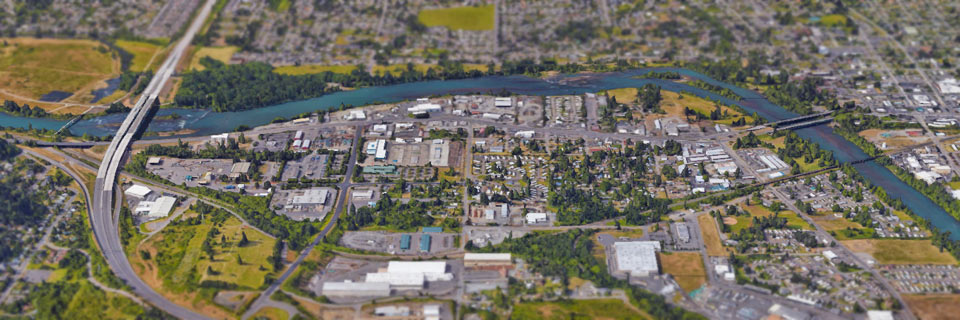

OREGON

Glenwood is an Unincorporated Community of
Glenwood is one of the communities that make up Lane County, Oregon. Glenwood is an unincorporated community in Lane County, Oregon. Located between the cities of Springfield and Eugene, on the route of the former Pacific Highway, which is now named Franklin Boulevard.
Once a home to fruit orchards and bean fields, Glenwood now serves as a bridge between the commercial centers of downtown Eugene and Springfield. One the area's major features is it's extensive amount of river front property. Glenwood is 2 miles away from the Howard Buford Recreation Area and Mount Pisgah Arboretum, which is an excellent place for hiking, relaxing along the banks of the Willamette River, a picnic, or birdwatching.
Glenwood is ideally situated less than a mile from both Eugene and Springfield Oregon, where many residents commute to work and do their shopping.
Read an archived article from 2006 about changes in store for the community of Glenwood Oregon.
Updated 2018: Glenwood Refinement Plan
Glenwood Outta Sight
Secret gardens among trailers and tire shops
By Orna Izakson
Many people think they know Glenwood. Maybe you're one of them.
Maybe you think the Glenwood is just the ugly strip along Franklin Boulevard you see driving between Springfield and Eugene. Maybe you know it as used car lots, pawn shops, a pizza place, a cut-rate auto parts store, a bar. Maybe you bring stuff to the dump. Maybe you don't even stop.
Or maybe you've heard about Glenwood's people, and maybe what you've heard is bad. Maybe you've heard about poverty and drugs and trailers and run-down houses with peeling paint.
But if you thought to turn down one of the streets you barely notice from Franklin or Henderson or Glenwood Boulevard, you might catch your breath. You might find little bits of magic. Glenwood's façade hides its heart and happy secrets: The gardens. The neighbors. The big old trees. The big old lots with (relatively) affordable houses on them. The way we watch out for each other. The way we watch out that the powers that leave us alone.
But maybe the biggest secret is this: If you knew Glenwood, you might wish you lived here, too.
Peas and Outlaws
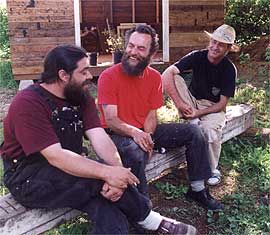
Dave Carvo had been on the road in his mobile home for five years, working construction for five years when he discovered Glenwood.
"I took a wrong turn one day, ended up in Glenwood, and it was home," he says. "It has an air of you don't have to fit a mold. It's always been a place for non-mainstream culture."
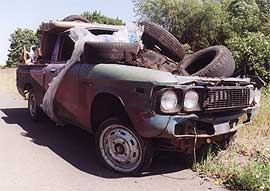 The union plumber saw his two-bedroom, 1930s house listed for sale on the Internet, and put money down without ever seeing it.
The union plumber saw his two-bedroom, 1930s house listed for sale on the Internet, and put money down without ever seeing it.
"It would've been bulldozed if I hadn't gotten my hands on it. By today's property and investment standards, our dirt in Glenwood is worth more than our houses."
More than anything, living in Glenwood is about the community here.
"It's a community like the good old days that everybody wants to go back to," he says, "where you can go over to your neighbor and borrow something. Most communities today, people don't even know who their neighbors are."
If you think he's exaggerating, try this: My neighbor Lisa, who has turned all the open ground on her property into garden space, walks to the houses of her friends carrying baskets of her overabundant peas, other produce or flowers. Two neighbors have keys to Dave's house so they can use his high-efficiency, front-loading washer and gas dryer.
That community spirit is also what my landlady, Joan Armstead, likes about Glenwood. She moved away a couple years ago, but at the end of the summer she says she's coming back. "When you drive down on Franklin you would never realize that there was a nice residential area tucked away behind the businesses, where a lot of the streets give you the felling of walking down a country lane," she says.
For Ted Russell, who grew up in Eugene and moved to Glenwood eight years ago, it's about the old trees. "This is why I decided to move here, is all the diverse trees. I mean, it was a conscious decision that I needed to live here."
From his small deck, the handyman/craftsman can see something like a dozen different species: noble fir, grand fir, Douglas fir, cedar, quaking aspen, giant native cherry, red alder, black walnut, a bunch of apples, plum, maple, willow, bing cherry, plum, filbert, black locust.
"This is one of my favorite places to be," he says. "Even though you can hear the freeway… or the train going by, it's still one of the most peaceful, serene places in or around the Eugene/Springfield area. And we're just right off Franklin."
The neighborhood is, most people agree, an "eclectic mix." It's old people and students, hellraisers and artists, classical musicians and students, activists and teachers.
"Glenwood is where the outlaws go to retire," says Steve Moe, a lifelong Glenwood resident who lives in the house his parents built before he was born. He means that in a good way: "It's people who've been out there and have raised some hell and picked Glenwood. And they're not going to let it happen any more, the things they did."
Steve is mostly talking about drugs, but the outlaw mentality is pervasive here. And while it is mature, it's definitely not in retirement. For years the area has housed activists, but here the activists are grownups who generally get along. Glenwood for the most part gives its residents the respect and tolerance we don't get from neighbors in Eugene.
Is it Contagious?
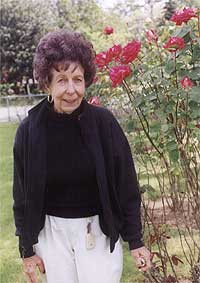 In 1954, Dorothy Westover and her husband, Ralph, saw an ad in the paper for a house on an acre with good garden soil going for $7,500. Oregon wasn't building housing during World War II, and the young couple had been living all over, in rented rooms and the Creswell-area cabin provided to workers like her husband who built Dorena Dam. They moved in the day before Easter.
In 1954, Dorothy Westover and her husband, Ralph, saw an ad in the paper for a house on an acre with good garden soil going for $7,500. Oregon wasn't building housing during World War II, and the young couple had been living all over, in rented rooms and the Creswell-area cabin provided to workers like her husband who built Dorena Dam. They moved in the day before Easter.
"It was the happiest day of my life," she says over root beer in her immaculate kitchen.
But when her daughters finished their years at the Glenwood School and went on to Roosevelt High, Dorothy found out what neighbors in Eugene thought of her bit of paradise.
They called her daughters "Glenwood grease" and "Glenwood scum." One of the girls skipped school to avoid the taunts. When Dorothy came to speak with the principal about her daughter's absences, she heard that her children's dresses were just as nice as the other girls' — as if that were all that mattered.
"I didn't know Glenwood had such a bad name," she says. "It always has. I don't know why. I don't like people who are that judgmental."
She herself found people would shrink back from her as if she had something contagious when they learned she lived in Glenwood. As if it were catching.
"But really, anymore I couldn't care less," she says. "They're not my kind of people."
These days, Dorothy own a big chunk of the heart of the little residential area that's the core of Glenwood's neighborhood. She could easily sell it and buy something fabulous up on College Hill. Given that, would she really rather stay put?
"You bet I would," she says. "I want to live here the rest of my life. I love my little home."
Dorothy Westover
Knocking on Doors
There's an axiom here that you have to live in Glenwood to find a place in Glenwood. You hear through the grapevine that a house is up for rent, up for sale, and you walk over and knock on the door. I found the place I live now when I lived a block from here. Dave, who told me about it, makes a point of knowing what's open and who's looking.
Dave's house is a good example of the Glenwood Way. Blacksmith Bear Diriwachter used to live there, but the person he rented from lost the house to the bank.
"We did everything in our power to keep anyone from buying it," he says. "We did a good job, too."
As a renter, Bear and his partner were notified whenever a prospective buyer would come around.
"The neighbors would basically orchestrate chaos," he says. "A lot of it just happened naturally. You know, it's Glenwood."
Bear and his partner are buying a house down the street, from one neighbor and with the help of another.
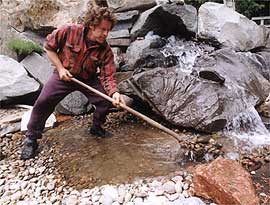 Then the house behind Dave's, with which he shares a yard, came up for sale.
Then the house behind Dave's, with which he shares a yard, came up for sale.
Chaone Mallory, her partner and their 2-year-old daughter were looking for a place they could afford. They couldn't afford very much, so they ended up in Glenwood.
When Chaone got out of the Realtor's car, Dave was working on his roof. She called up to him, asking how the neighborhood was.
"Just fine if you don't mind old hippies, old bikers and Earth First!ers," he called back down.
Although it would sound good to say so, that's not why they bought the house. Chaone, who is working on a Ph.D. on ecofeminist political philosophy at UO, says she had nightmares thinking about moving to Glenwood, because of its reputation, but it was the best house in their price range. Since moving, though, her concerns have faded.
"The neighbors watch out for one another," she says. "I feel at ease here now."
Some neighbors worry that Glenwood will be discovered and gentrify. Others aren't afraid.
"Yeah, I want to gentrify Glenwood, but by my standards," Bear says. "Gentrification to me is artists and hippies, for this situation."
Stone worker Keith Schneider works on a backyard project.
Skating and Zoning
Once upon a time, Franklin Boulevard was the Pacific Highway, the main drag connecting Seattle and San Diego. It curved through vineyards and orchards where the Willamette River turns south in Glenwood.
The area remained largely undeveloped for years because of the flooding that came before the dams locked up the river. The area was something of a Seavey Loop with car campgrounds for the travelers — a business that could easily survive the floods by simply moving the cars on.
In 1935, residents built a four-room schoolhouse on Franklin. Nearby James Park was the first in the Willamalane Park District. In 1940 there were 1,800 people living in Glenwood. Across the river, Springfield's population wasn't much higher, just 3,800. In the 1940s, one of Glenwood's three grocery stores was the number-two grossing market in all of Oregon.
Children spent their summers in the social scene of the bean fields, picking their money for school clothes, or skating in circles at the hexagonal roller rink near the school. All around were orchards of apples, peaches, filberts and grapes all in a row.
The big supermarket burned down on New Year's Day 1950. The auto courts morphed into trailer parks. In the 1960s, an agreement with Eugene closed the school and began busing the children to Laurel Valley, then to Eugene proper, and taking a piece of Glenwood's heart away with them.
As Springfield grew, Glenwood stagnated. The school ground is now the drain field for a river-front trailer park where few residents can actually see the water. Midway Manor, another trailer park, covers soil that fed Davidson Bean Yard in the '40s. Only a handful of new houses have been built in the last three or four decades.
Senate Bill 100's land-use rules were implemented in the early 1980s, Glenwood ended up under Eugene's jurisdiction because of its historic relationship through the schools and because, Steve Moe says, Springfield couldn't afford it. "It was sort of a joke over there that the loser would get Glenwood." A Nov. 30, 1997 Page One headline in The Register-Guard called Glenwood the "area's urban orphan."
Eventually Glenwood moved into Springfield's urban growth boundary, slated to fill in eventually as population grows. Commercial parts of Glenwood that already had sewer lines — along Glenwood Boulevard and some of Franklin — have been annexed, but the residential areas retain their independence.
The fight over moving Glenwood into Springfield's jurisdiction was a clear sign that even if the area lost its school, its roller rink and its supermarket, Glenwood wasn't just going to fade away. In among the acre-lots, the gardens, the rose-fenced horse paddock, there's still a strong neighborhood that will fight for its survival.
In many ways, the battle over the move was a battle over political affinities: Some wanted to stay with left-leaning Eugene, others with more conservative Springfield.
It also was a battle over development. Springfield may be less likely to force annexation on the area than Eugene's track record would suggest: "Springfield just has no interest in forcible annexing people," says Mark Metzger, a senior planner with Springfield. "That's just been the philosophy of our City Council."
But the council's concerns about property rights lead some Glenwood residents to worry that anyone with money to develop will be able to build whatever they want and Glenwood — and especially its riverfront — will become a sacrifice zone.
Dorothy's been bitten by those concerns, too. "I think sometime there's going to be someone coming in and want the land," she says. "And if they have the influence, they take it whether you want it or not."
But as one of the largest residential property owners in the area, and seen as a shrewd businesswoman, Dorothy has many of her neighbors worried. Will she sell the heart of the residential area and condemn the rest of us to an industrial park?
"That is the furthest thing from my mind," she says. "My biggest fear is that they'd come in and condemn the property and then get it for nothing."
She says she'd fight such a move, if it came to that.
Prime Glenwood Soil
Dave and I go out for burritos and then drive to a locked gate at the south end of Henderson. There's a big chunk of land by the railroad tracks, all gravel and weeds. I pick daisies and vetch and cornflowers from a field like a kid spending her long, dull, hot summer in what nature she can find. He points up. This area drains Moon Mountain, he says, into what's left of Glenwood Slough. ODOT plans to build a maintenance facility here, where they'll maintain their trucks and store the poisons they use for de-icing, weed killing and keeping their vehicles running.
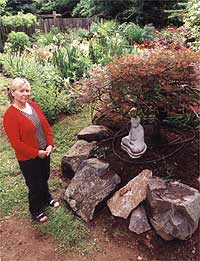 We find the shocking pink end of a newly planted 2x2 sticking up in the gravel, a marker for the building going in this year. A kick at the top inch shows it's planted deep.
We find the shocking pink end of a newly planted 2x2 sticking up in the gravel, a marker for the building going in this year. A kick at the top inch shows it's planted deep.
Back at the car we turn around and quickly turn left onto graveled a short, graveled street. The house on the corner is unexceptionally Glenwood, but I catch my breath as we pass what must be an acre of flowers and food.
"This is really nice," I exclaim, surprised, and then I laugh. That's precisely my point about Glenwood: You look at it and think it's ramshackle, maybe it's kind of scary. Then you turn a corner and find an almost rural gem. There are about seven houses tucked in here, shaded by trees. It's near the tracks like everything in Glenwood, but you can't see them through the thick, tall growth.
First thing Springfield did when they took over here, Dave says, is zoned this light industrial. That means the woman with the flowers couldn't divide her land for another house. Or, at least, it would make it much harder.
It's precisely this kind of thing that feeds the neighborhood's fears about Springfield, that they want to turn us into an industrial park. It's also not precisely true.
"Glenwood has always had that paranoia, even when it was in Eugene," Steve says. "It sort of seems to be an ongoing urban legend."
Several years ago, Glenwood residents got together to write up their own plan for the area's development, and that plan and the zoning it put in place transferred from Eugene to Springfield. The owners on 18th Street have a kind of mixed zoning, Steve says, which allows them to choose, lot by lot, whether to stay residential or go industrial. Most of the neighbors at the time wanted that, except for one who moved in late in the process.
"I wish we'd listened to him," Steve says. "Because he was right."
The impact of light industrial development along Henderson was more disruptive than people there expected, he says
Part of the shame of it, too, is that this is prime agricultural land, even if Oregon's land-use rules say it should eventually become city since it's sandwiched in between Eugene and Springfield.
The area around Steve's house and business was all a vineyard when he was a kid.
"Underneath this is still that prime Glenwood soil," he says. "Someday, it'll probably be a long time, but we'll be farming it again."
Sue Schneider
Drugs and Irises
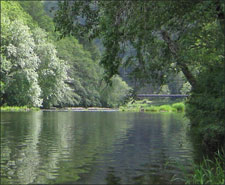 Yes, there are blocks, or sections of blocks, known to be problems, just as you would find anywhere. But that's a mask, too, hiding the neighborhood and its community as effectively as the ugly facades along Franklin do.
Yes, there are blocks, or sections of blocks, known to be problems, just as you would find anywhere. But that's a mask, too, hiding the neighborhood and its community as effectively as the ugly facades along Franklin do.
"It's kind of like New York City," Joan says. "When I visited there I found you could just walk across some streets and find a totally different socio-economic subculture."
The old buildings may look disheveled, but many hide secrets: the perfect, Glenwood-wrought stone fountain, a flower and herb garden that could be straight out of Sunset magazine or Better Homes and Gardens. People invest in Glenwood, if not necessarily monetarily on the outside of their houses.
Make no mistake. A lot of houses have long since broken their last legs. Some meth labs are likely left, or dealers, or both, despite a big drive by the neighbors six or seven years ago. Joan, who fought the meth labs, got busted herself for growing pot (for her personal use).
There are many unpermitted dwellings here, most of which fly below official radar. "We don't go for building permits here, we just do it," Steve says.
Dorothy keeps her house locked, even when she's out cutting her extravagant irises, roses and lilies, or the coral bells she got from her mother. And she admits the neighborhood is and always has been a mix of good and bad.
"I think it's got wonderful, wonderful people," she says of Glenwood. "It's a shame there are druggies, but they're in the best of neighborhoods."
Dorothy's got that right. Most neighborhoods have some of the worst problems you can find in Glenwood.
But how many can boast Glenwood's riches?
Originally published in Eugene Weekly on June 13, 2002

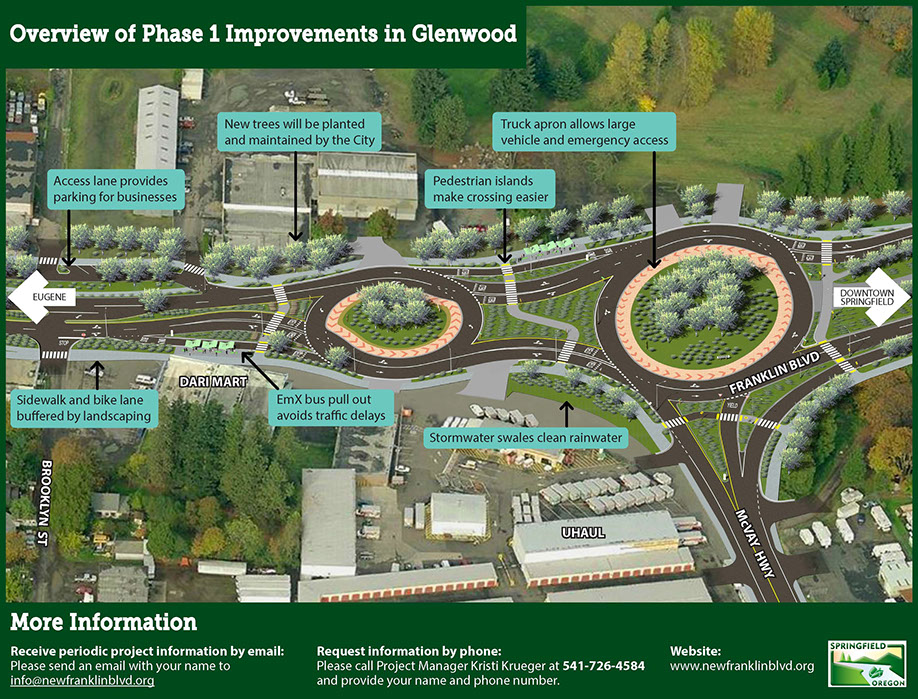
©2004-2018 Glenwood Oregon Guide